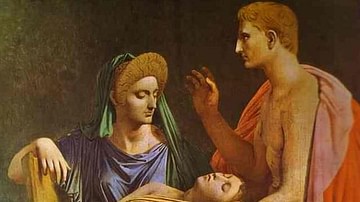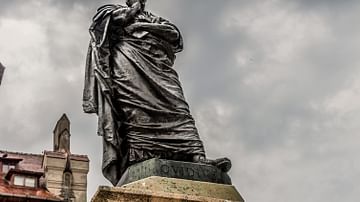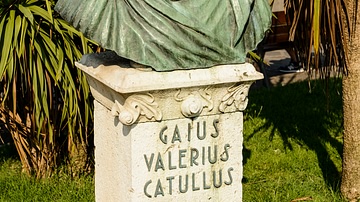Search
Search Results

Definition
The Aeneid
The Aeneid, written by the Roman poet Virgil (70-19 BCE), is a twelve-book-long epic poem that describes the early mythology of the founding of Rome. The eponymous hero Aeneas, a Trojan prince and son of Venus, faces trials and tribulations...

Definition
Christine de Pizan
Christine de Pizan (also given as Christine de Pisan, l. 1364 - c. 1430) was the first female professional writer of the Middle Ages and the first woman of letters in France. Her best-known works advocated for greater equality and respect...

Definition
Ovid
Publius Ovidius Naso, more commonly known to history as Ovid (43 BCE - 17 CE), was one of the most prolific writers of the early Roman Empire. His works of poetry, mostly written in the form of elegiac couplets, influenced many of the great...

Definition
Catullus
Gaius Valerius Catullus (84-54 BCE) was a Roman poet whose poems are considered to be some of the finest examples of lyric poetry from ancient Rome, despite his youth and early death. Catullus wrote in the neoteric style during the high point...

Definition
Persian Literature
Persian literature differs from the common definition of “literature” in that it is not confined to lyrical compositions, to poetry or imaginative prose, because the central elements of these appear, to greater or lesser degrees, in all the...

Video
Baal Epic Audiobook- Read by Killetz in English
An English Translation of the Baal Epic, As Read by your good friend Killetz.
Tells the story of Ba'al Hadad as written by the scribe Ili Milku in Ugarit.

Video
Epic Moments in History - The 9 Lives of Alexander the Great
Alexander the Great is one of the most famous historical figures of all time. Yet many are unaware of the 9 times he cheated death over the course of his epic campaigns into the east! Support future documentaries: https://www.patreon.com/InvictaHistory...

Video
The Epic of Gilgamesh: Crash Course World Mythology #26
This week, we're continuing our discussion of heroes by talking about Gilgamesh, star of one of the earliest written hero stories, The Epic of Gilgamesh. Gilgamesh was a terrible ancient king who left his kingdom seeking adventure, and eventually...

Video
Epic Moments in History - Top 10 Spartan One Liners
The Spartans are remembered as famous warriors but their words could be every bit as biting as their spears! Here is a top 10 list of the most epic Spartan one liners in history! Bibliography and recommended reading below: (Use affiliate...

Video
Enuma Elish | The Babylonian Epic of Creation | Complete Audiobook | With Commentary
This is the complete audiobook of the Enuma Elish : The Babylonian Epic of Creation that also comes with commentary. I hope that you all enjoy this awesome work that helps us better understand ancient Mesopotamian Mythology, Religion and...